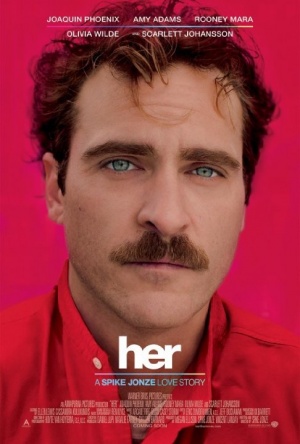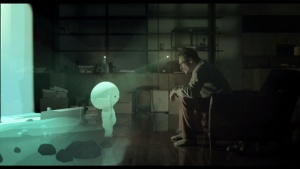Difference between revisions of "Her (film) (2013)"
(uhhh) |
(minor edits) |
||
| Line 1: | Line 1: | ||
[[File:Her.jpg|thumbnail|right|Her (2013) Official Film Poster, Spike Jonze]] | [[File:Her.jpg|thumbnail|right|Her (2013) Official Film Poster, Spike Jonze]] | ||
| − | ''Her'' is a 2013 science fiction film with romantic and comedic elements | + | ''Her'' is a 2013 science fiction film with romantic and comedic elements that was written, directed, and produced by [https://en.wikipedia.org/wiki/Spike_Jonze Spike Jonze]. The lead cast includes [https://en.wikipedia.org/wiki/Joaquin_Phoenix Joaquin Phoenix] as Theodore Twombly and [https://en.wikipedia.org/wiki/Scarlett_Johansson Scarlett Johansson], who provides the voice for Samantha, Theodore's AI Operating System. The supporting cast includes [https://en.wikipedia.org/wiki/Amy_Adams Amy Adams], [https://en.wikipedia.org/wiki/Rooney_Mara Rooney Mara], and [https://en.wikipedia.org/wiki/Olivia_Wilde Olivia Wilde]. ''Her'' was well-received by critics and was featured at multiple film award celebrations, including the 86th Academy Awards. It earned 5 Oscar nominations, including Best Picture, Best Original Score, Best Original Song, Best Production Design, and Best Writing, which it won. |
== Plot == | == Plot == | ||
| − | '''*Note: the exploration of certain ethical | + | '''*Note: the exploration of certain ethical dilemmas presented below requires divulging into plot and story elements.* |
''' | ''' | ||
| − | Theodore Twombly is a lonely, | + | Theodore Twombly is a lonely, heart-broken white guy working and living in the city. With curiosity, he purchases OS 1, the first artificially intelligent operating system. His OS is named Samantha, who is a fictional character characterized sophisticatedly through precise dialogue and a sexy, familiar, and soothing woman's voice (Scarlett Johannson). |
Over the course of the film, Theo and Samantha develop an intimate human-A.I relationship, which is part rooted in romance, part in convenience, and part in the inherent productivity. The question (/hook) of the film is in exploring the boundaries and emotional depth between human and artificially intelligent beings | Over the course of the film, Theo and Samantha develop an intimate human-A.I relationship, which is part rooted in romance, part in convenience, and part in the inherent productivity. The question (/hook) of the film is in exploring the boundaries and emotional depth between human and artificially intelligent beings | ||
| Line 25: | Line 25: | ||
| − | Luciano | + | Luciano Floridi describes four revolutions affecting introversive and extroversive human existentialism thought. The most recent is the Turing Revolution, which Floridi explains as the shifting narrative from humans as significant and alone in cognitive capacity to one where humans operate as "informational organisms (''inforgs''), mutually connected...embedded in an informational environment, which we share with other informational agents, both natural and artificial, that also process information logically and autonomously" <ref>Floridi, "Self-Understanding: The Four Revolutions," in Floridi, ''The Fourth Revolution'' (2014).</ref> |
| − | While A.I. hasn't come to fruition in reality 2016, it seems that by "increasingly delegating...to artificial agents our memories, decisions, routine tasks, and other activities <ref> | + | While A.I. hasn't come to fruition in reality 2016, it seems that by "increasingly delegating...to artificial agents our memories, decisions, routine tasks, and other activities <ref>Floridi, "Self-Understanding: The Four Revolutions," in Floridi, ''The Fourth Revolution'' (2014).</ref>, humans are trending towards wider acceptance, or at least reliance, on computing devices. With his writing, Jones enters into a realm part science fiction, part futuristic projection, a world where humans in American culture accept the implications of socially accepting A.I. as beings unique and of worth, a world where humans/A.I. emotional relationships are viable and valued. This portrayal invites the audience to inquire about impracticality of rejecting A.I. What does it mean for artificially intelligent beings to invoke human emotions in humans? What does it mean for one to accept a computer's curiosities and attention as valuable? If A.I. is capable, and if humans are accepting of the novelty, then ''Her'', as a film, demonstrates how indiscreet the line is between the infosphere and the physical world actually is. |
| − | Taken without context, it seems that through the presentation of Samantha, Spike Jones is surfacely arguing that AI should be considered an independent, autonomous agents "that are sufficiently informed, 'smart' autonomous and able to perform morally relevant actions independently of the humans who created"<ref> | + | Taken without context, it seems that through the presentation of Samantha, Spike Jones is surfacely arguing that AI should be considered an independent, autonomous agents "that are sufficiently informed, 'smart' autonomous and able to perform morally relevant actions independently of the humans who created"<ref>Floridi, ''Cambridge Handbook'', Chapter 5, "In search of a unified approach to information ethics</ref> her. |
=== Video game === | === Video game === | ||
[[File:Her-videogame.jpg|thumbnail|left|A video game played by Theo Twombly during several scenes in the film, Her (2013)]] | [[File:Her-videogame.jpg|thumbnail|left|A video game played by Theo Twombly during several scenes in the film, Her (2013)]] | ||
| − | Theodore Twombly spends several scenes sitting on his couch using his hands and voice to interact with a | + | Theodore Twombly spends several scenes sitting on his couch using his hands and voice to interact with a holographically projected video game, the main character of which is a little, turquoise alien. The audience is led to understand that the video game character, like Samantha, has artificial intelligence (or at least incredible natural language processing). He curses and swears at Theo while he plays, which is part of the hook. However, an A.I. agent designed to curse at an audience is ethically challenging in a similar vein as real-life video games. |
| − | As an art and entertainment medium, violent [https://en.wikipedia.org/wiki/Video_game_controversies video games] have been the subject of much talk and speculation about the effect that increasingly violent video games have on addicted adolescents. According to his chapter on | + | As an art and entertainment medium, violent [https://en.wikipedia.org/wiki/Video_game_controversies video games] have been the subject of much talk and speculation about the effect that increasingly violent video games have on addicted adolescents. According to his chapter on values laden in technology, Phillip Brey contests that design decisions result in outcomes which reflect and incorporate cultural symbolism. Specifically, the question here is whether the representation of a cursing, green alien character is ''Her'' "reveals racial prejudices or patriarchal values...of designers [of ''Her,'' the protagonist as an average Joe, or even the audience of ''Her'' as a film <ref>Floridi, ''Cambridge Handbook'', Chapter 3, "Values in technology and disclosive computer ethics."''.</ref> |
== Culturally fictional elements == | == Culturally fictional elements == | ||
| Line 42: | Line 42: | ||
=== Beautifulhandwrittenletters.com === | === Beautifulhandwrittenletters.com === | ||
| − | The company that protagonist Theo | + | The company that protagonist Theo Twombly works for allows customers to purchase hand-written love letters to spouses. What's seemingly the gimmick is that the spouses aren't aware of the third party. Spike Jones seems to explain the fore-front objection that a third-party agent would have difficulty connecting their words to the real and intimate memories of clients by alluding to a long-time relationship between employees of the company and its clients. This appears both ethically convoluted and worth examining because unknowing spouses may/may not have consented to any pleasure derived from the service, not to mention the implication of Beautiful Handwritten Letters employees being exposed to non-consensual information about the client of the service. |
However, ethical implications here seem to stem from a more interpersonal, rather than informational, nature. | However, ethical implications here seem to stem from a more interpersonal, rather than informational, nature. | ||
Revision as of 21:35, 25 April 2016
Her is a 2013 science fiction film with romantic and comedic elements that was written, directed, and produced by Spike Jonze. The lead cast includes Joaquin Phoenix as Theodore Twombly and Scarlett Johansson, who provides the voice for Samantha, Theodore's AI Operating System. The supporting cast includes Amy Adams, Rooney Mara, and Olivia Wilde. Her was well-received by critics and was featured at multiple film award celebrations, including the 86th Academy Awards. It earned 5 Oscar nominations, including Best Picture, Best Original Score, Best Original Song, Best Production Design, and Best Writing, which it won.
Contents
Plot
*Note: the exploration of certain ethical dilemmas presented below requires divulging into plot and story elements.*
Theodore Twombly is a lonely, heart-broken white guy working and living in the city. With curiosity, he purchases OS 1, the first artificially intelligent operating system. His OS is named Samantha, who is a fictional character characterized sophisticatedly through precise dialogue and a sexy, familiar, and soothing woman's voice (Scarlett Johannson).
Over the course of the film, Theo and Samantha develop an intimate human-A.I relationship, which is part rooted in romance, part in convenience, and part in the inherent productivity. The question (/hook) of the film is in exploring the boundaries and emotional depth between human and artificially intelligent beings
Film aesthetics
Voice/voice acting
Much of the innovation of this film at the time lies in the creative novelty of characterizing a main character exclusively with voice.
Science fictional elements
Samantha
Upon initialization of his artificially intelligent operating system and personal assistant, Theodore Twumbly asks it what its name is. The OS responds with the name Samantha, a name it says it had chosen on the spot, after 'reading' a digital baby naming book. The writer takes special care to personify and humanize the so-called computer: it has a soothing and arousing voice, a normal name, it reads, laughs, jokes, and advises. Samantha has emotions and seems to feel.
Luciano Floridi describes four revolutions affecting introversive and extroversive human existentialism thought. The most recent is the Turing Revolution, which Floridi explains as the shifting narrative from humans as significant and alone in cognitive capacity to one where humans operate as "informational organisms (inforgs), mutually connected...embedded in an informational environment, which we share with other informational agents, both natural and artificial, that also process information logically and autonomously" [1]
While A.I. hasn't come to fruition in reality 2016, it seems that by "increasingly delegating...to artificial agents our memories, decisions, routine tasks, and other activities [2], humans are trending towards wider acceptance, or at least reliance, on computing devices. With his writing, Jones enters into a realm part science fiction, part futuristic projection, a world where humans in American culture accept the implications of socially accepting A.I. as beings unique and of worth, a world where humans/A.I. emotional relationships are viable and valued. This portrayal invites the audience to inquire about impracticality of rejecting A.I. What does it mean for artificially intelligent beings to invoke human emotions in humans? What does it mean for one to accept a computer's curiosities and attention as valuable? If A.I. is capable, and if humans are accepting of the novelty, then Her, as a film, demonstrates how indiscreet the line is between the infosphere and the physical world actually is.
Taken without context, it seems that through the presentation of Samantha, Spike Jones is surfacely arguing that AI should be considered an independent, autonomous agents "that are sufficiently informed, 'smart' autonomous and able to perform morally relevant actions independently of the humans who created"[3] her.
Video game
Theodore Twombly spends several scenes sitting on his couch using his hands and voice to interact with a holographically projected video game, the main character of which is a little, turquoise alien. The audience is led to understand that the video game character, like Samantha, has artificial intelligence (or at least incredible natural language processing). He curses and swears at Theo while he plays, which is part of the hook. However, an A.I. agent designed to curse at an audience is ethically challenging in a similar vein as real-life video games.
As an art and entertainment medium, violent video games have been the subject of much talk and speculation about the effect that increasingly violent video games have on addicted adolescents. According to his chapter on values laden in technology, Phillip Brey contests that design decisions result in outcomes which reflect and incorporate cultural symbolism. Specifically, the question here is whether the representation of a cursing, green alien character is Her "reveals racial prejudices or patriarchal values...of designers [of Her, the protagonist as an average Joe, or even the audience of Her as a film [4]
Culturally fictional elements
Beautifulhandwrittenletters.com
The company that protagonist Theo Twombly works for allows customers to purchase hand-written love letters to spouses. What's seemingly the gimmick is that the spouses aren't aware of the third party. Spike Jones seems to explain the fore-front objection that a third-party agent would have difficulty connecting their words to the real and intimate memories of clients by alluding to a long-time relationship between employees of the company and its clients. This appears both ethically convoluted and worth examining because unknowing spouses may/may not have consented to any pleasure derived from the service, not to mention the implication of Beautiful Handwritten Letters employees being exposed to non-consensual information about the client of the service.
However, ethical implications here seem to stem from a more interpersonal, rather than informational, nature.
OS Surrogate Sex
As the romantic relationship between Theo Twombly and his OS, Samantha, thickens, an interpersonal barrier comes to fruition around the noticeably lacking of physical connection. In an attempt to overcome this barrier and strengthen their relationship, Samantha engages in and schedules a surrogate, someone willing to perform sexual activities in the stead of the OS partner, and the way she does this is to operate and engage in sexual activities through camera and audio data processing.
To examine ethical implications, which in this case may be outside the scope of this project, include much of the modern monogamist literature as well as interpersonal implications on the emotional affect on (at least) human participants, Theo (uncomfortable engaging in flesh as a stead for his digital girlfriend) and the surrogate (ashamed as if Theo's rejection was a human-centric judgement, as opposed to personal ideological judgement.)
Ethical Issues
Human Relationships with Artificial Intelligence
One issue that arises in this film relates to the concept of mutual love between human beings and artificial intelligence devices. In the film, Theo and Samantha appear to share a mutual love, despite their lack of physical connection. Yet, artificial intelligence moves at a much faster pace than the human mind. As a result, it seems unrealistic that AI would love a human being who cannot keep up with its speed or brainpower to any extent. The artificial intelligence is much smarter than the human being, and therefore could use this power to manipulate the human's actions. This poses a huge risk if the artificial intelligence were to fall into the wrong user's hands. The human may continue to build love for its device, even though the experience will continue to remain one-sided. [5]
References
- ↑ Floridi, "Self-Understanding: The Four Revolutions," in Floridi, The Fourth Revolution (2014).
- ↑ Floridi, "Self-Understanding: The Four Revolutions," in Floridi, The Fourth Revolution (2014).
- ↑ Floridi, Cambridge Handbook, Chapter 5, "In search of a unified approach to information ethics
- ↑ Floridi, Cambridge Handbook, Chapter 3, "Values in technology and disclosive computer ethics.".
- ↑ Understanding 'Her': Experts Ponder The Ethics Of Human-AI Relationships, Palmer, Roxanne, 17 January 2014 http://www.ibtimes.com/understanding-her-experts-ponder-ethics-human-ai-relationships-1543763



